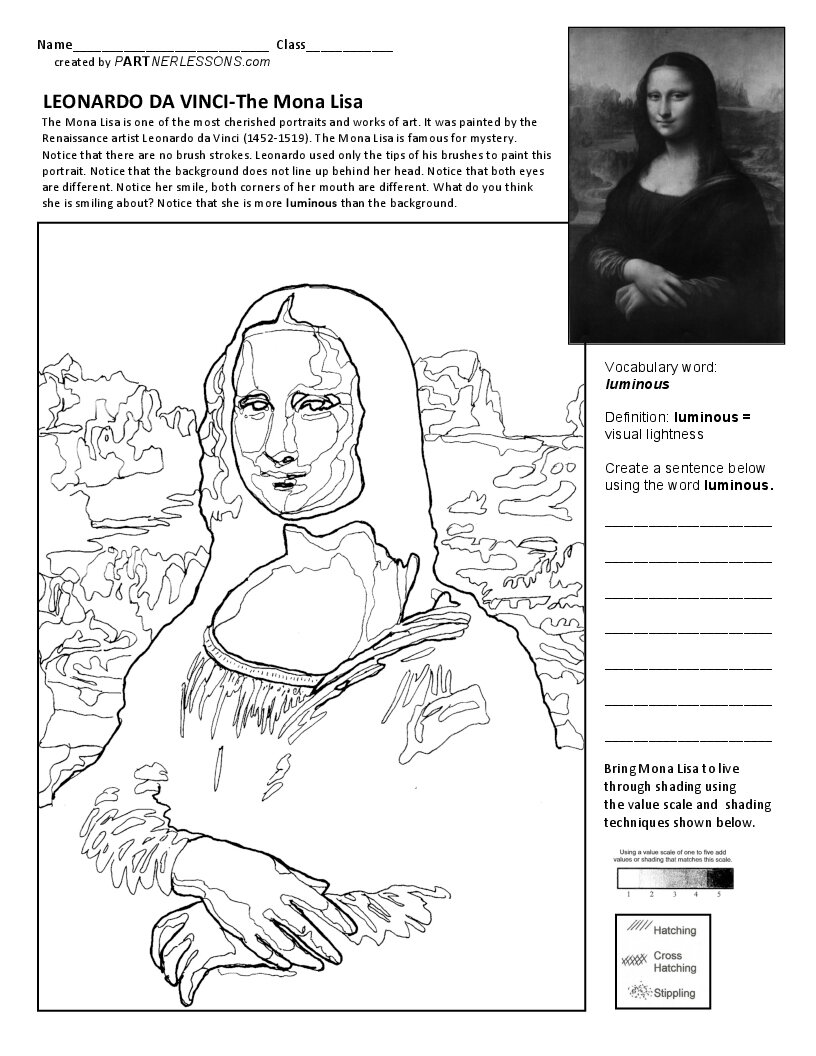Discovering
Leonardo da Vinci
Leonardo
da Vinci
In the early era of the first half of the 16th century a cultural world wide revival occurred. This revival was established because of the Catholic Church has been the inspiration of the progressive societies of Europe. With the entrance of the reformation (a time when many Catholics challenged the teachings of the church forming a revolt) a new time of freedom was born that sought to embrace man as opposed to the Catholic traditions. This form of new thinking released many artists to create without any boundaries. Prior to this new era and way of thinking, portraits of religious figures from the Bible were created to appear flat or 2 dimensional because the church did not believe man should attempt to make God human, even portraits of Jesus. This new era was labeled the Renaissance and as it spread around the world it evolved into being called the High Renaissance.
Your assignment: There are four assignments attached to this lesson. The first one is an assessment on the reading. The other three are the art work sheets on creating a Leonardo da Vinci work of art. Drag the sheets onto your desktop, print them out and use color pencil or lead to complete the lessons. When you are finished place the images four up and make one photo to send to ihs.db@yahoo.com. You have two weeks to compete these lessons.
The Mona Lisa or La Giocond French: La Joconde is a half-length portrait painting by the Italian Renaissance artist Leonardo da Vinci that has been described as "the best known, the most visited, the most written about, the most sung about, the most parodied work of art in the world". The Mona Lisa is also one of the most valuable paintings in the world. It holds the Guinness World Record for the highest known insurance valuation in history at US$100 million in 1962 (equivalent to $620 million in 2016).
One of these great artists was an Italian who was from a small village in Italy called Vinci. He became known as Leonardo da Vinci or (Leonardo of the village of Vinci). He created a form of painting called sfumato, which means without lines or brush stokes. Using only the tips of his brushes, Leonardo applied his paint in thousands of soft touches to create a realistic appearance of his subjects.
As time passed in the life of Leonardo his genius went far beyond the painted canvas. He was a prolific inventor. The following is a more formal reading of this great genius.
Leonardo di ser Piero da Vinci (1452 -1519) was born on 15 April 1452 near the Tuscan town of Vinci, the illegitimate son of a local lawyer. Leonardo died at Clos Lucé, on 2 May 1519 at the age of 67. The cause is generally stated to be recurrent stroke. He was apprenticed to the sculptor and painter Andrea del Verrocchio in Florence and in 1478 became an independent master.(April 15, 1452 – May 2, 1519), more commonly Leonardo da Vinci or simply Leonardo, was an Italian leader of the High Renaissance era whose areas of interest included invention, drawing, painting, sculpting, architecture, science, music, mathematics, engineering, literature, anatomy, geology, astronomy, botany, writing, history, and cartography. He has been variously called the father of palaeontology, ichnology, and architecture, and he is widely considered one of the greatest painters of all time. Sometimes credited with the inventions of the parachute, helicopter, and tank, he epitomised the Renaissance humanist ideal.
Salvator Mundi
(Italian for Savior of the World)
Vitruvian Man
The Last Supper
Leonardo is renowned primarily as a painter. The Mona Lisa is the most famous of his works and the most parodied portrait,and The Last Supper is the most reproduced religious painting of all time. His drawing of the Vitruvian Man is also regarded as a cultural icon, being reproduced on items as varied as the euro coin, textbooks, and T-shirts. His painting Salvator Mundi sold for $450.3 million at a Christie's auction in New York on November 15, 2017, the highest price ever paid for a work of art. Perhaps 15 of his paintings have survived.
After reading all the material presented on Leonardo da Vinci, discover the correct answer for each multiple choice question below then submit your answers to automatically entered into your grade.
See if you can beat clock by putting the Mona Lisa together!
When these images are complete please cut the image out to fit and paste into your sketchbook.








